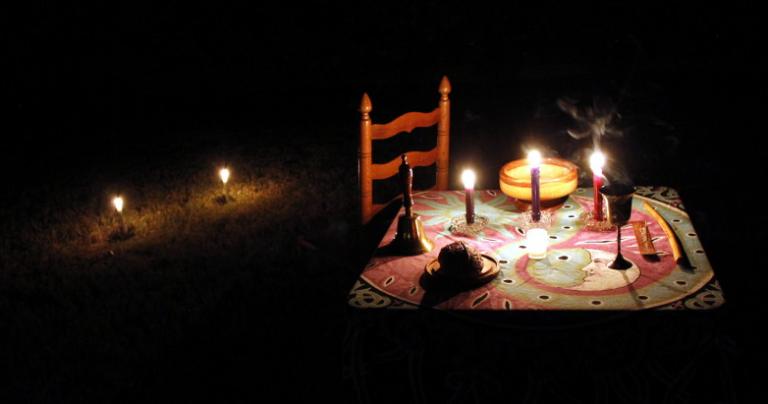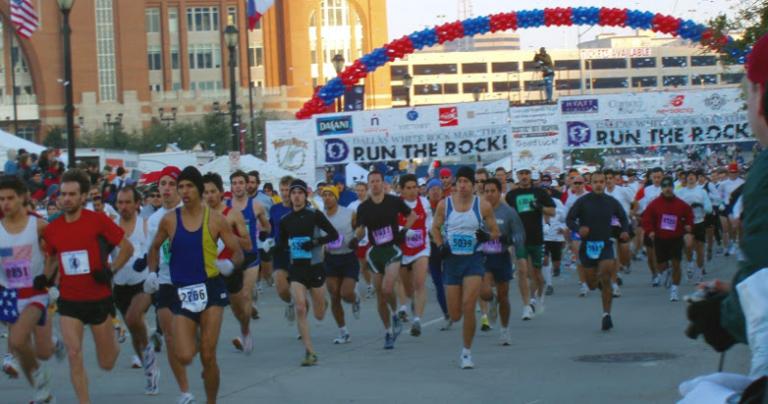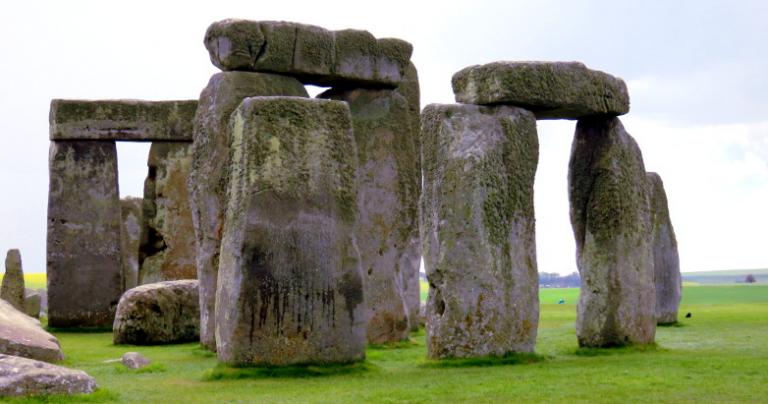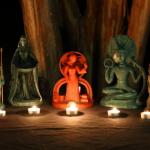Back at the end of February I came across this excellent piece by Heron Michelle titled Witchery as an Orientation and Sacred Mission. It’s her story of how being a witch isn’t a choice for her – it’s part of who and what she is. The essay is worth your time to read in its entirety – here’s a key quote:
Witchery isn’t a choice for me. There is a being-ness to witchery, the aptitude for deeply, broadly sensing a far greater “normal” than others … Those with an orientation of witchery, naturally glide past the veil of illusion as our second-nature. This tends to become isolating, as muggle-society pushes us to the fringes, and calls us “crazy.”
And another:
“Have you always been a witch?” is as ridiculous a question to me, as “have you always been bi-sexual?” … I could have chosen to never tell a soul, never date a woman… I might have even died a virgin, and yet this would still *be* my sexual orientation.
Similarly, participation in witching culture is not a requirement. However, I do solemnly believe that a person will live a far happier and fulfilled life if they outwardly participate in both their sexual and spiritual orientation’s culture.
The piece is excellent and I encourage you to read the whole thing. Parts of Heron Michelle’s story resonate with me and I want to explore this concept in more depth. There is a possibility for this to be abused – people who want to feel special and exclude others – but that doesn’t negate the truth of witchery or Paganism or polytheism as an orientation, as an integral part of who and what we are.
How did I end up Pagan?
I’ve told my story of leaving fundamentalist Christianity and finding my way into Paganism many times. What I haven’t discussed – and haven’t thought much about – is how that was even possible.
My entire extended family are Christians – most are Methodists, some are Baptists, and a few are Catholics. While changing your religion is a commonplace thing in this culture, the vast majority of changes are from one version of the same religion to another. Why didn’t I become an Episcopalian or a UU Christian? It can’t all be external influences.
And why did I never consider becoming an atheist? I cannot and do not believe the God of fundamentalist Christianity exists. But I always thought “God is better than that” rather than “there is no God.”
There has always been something inside me that said “Nature is sacred.” There has always been something that said “there’s more to life than what can be measured and quantified.” I’ve always known the Divine has a feminine side, that the world is full of spirits, and that magic is real.
Our mainstream society screams the opposite and pressures us to conform to materialist assumptions, monotheist beliefs, and patriarchal culture. It’s in the very air we breathe, and if we don’t pay close attention, we just assume that’s the way things are supposed to be. We can be the religious equivalent of gay people who suppress their same-sex orientation because of the demands of society, to the point they don’t even realize they’re gay… and then wonder why their lives are unfulfilling.
It took years, but I accepted that this is who and what I am. And I’m better off for it.
The danger of feeling special… and exclusionary
My biggest concern with the idea of Paganism as an orientation is how some people have used it as a way to feel special (i.e. – better than everybody else) and to exclude those they deem insufficiently special. Some like to repeat the old saying “a witch is born, not made.”
But it need not be this way. We’re starting to learn that sexual orientation and gender identity are more of a spectrum than a binary choice. There is no human attribute that is evenly distributed throughout the population. Some are tall and some are short. Some have superior eyesight and some need glasses – and some are blind. Some have an aptitude for languages, some for math, and some for music. That doesn’t mean we shouldn’t include anyone with an interest in our communities and interest groups.
I was born with minimal athletic talent. I wanted to be a baseball player, but I didn’t have the skills. I sucked at little league, and no amount of coaching and practice was ever going to make me a major leaguer. But I played low-level softball for several years and enjoyed it. And when I started running, I found that almost anyone can run a marathon, if you put in the effort to train for it. There were several times I lined up in the same races with professional runners from Kenya and Ethiopia (and the United States). I finished well after them, but I ran in the same races they did.
Some of us have a natural talent for witchery, or journeying, or for talking with spirits. It comes easier for us, and with work, we can achieve things most people can’t. But most anyone (though not everyone) can do these things, to some degree. Let’s always welcome and encourage them. They add to the diversity and strength of our communities, and there are times when we need what they’re good at.
And besides, it’s the right thing to do.
Pagan orientation may be wider than we think
Our species is perhaps 200,000 years old. We spent the vast majority of that time living on the land. We’ve spent less than 10,000 years living in cities, and about 300 years in an industrial society. We are adapted to live close to Nature, and separated from Nature we feel something is wrong, something is missing. Modern Paganism is in part a reaction to that separation – we have an orientation toward Nature.
In her 2014 book A Million and One Gods – the Persistence of Polytheism, Page duBois demonstrated that there are no pure monotheistic religions. Christianity has its Trinity. Islam, perhaps the closest to pure monotheism, still has angels and a devil.
In 2005’s A World Full of Gods, John Michael Greer showed the intuitive appeal of polytheism. And let’s not forget the origins of the word “pagan” – from the Latin paganus, meaning “country dweller.” It was used a term of derision against the native Britons who kept their indigenous religion instead of adopting the sophisticated religion of their Roman (and soon to be Christian) conquerors.
Why do so many new Pagans say “it feels like coming home”? Why do people who never give any religion a second thought talk about “the Gods of Baseball” or some other activity or pursuit? Why do our Christian and agnostic friends ask us to read Tarot or work magic for them? If they really thought it was useless, they wouldn’t bother. They may be afraid of the ridicule of their educated and rational friends, or the condemnation of their preacher, but something inside them whispers “this works.”
Paganism – or at least, Pagan concepts and practices – may very well be humanity’s default orientation.
Orientations have to be accepted and nurtured
Our mainstream society is far more accepting of LGBTQ people than it used to be, but we still occasionally see a bittersweet story of someone who comes out late in life. We’re happy they finally accepted that they are who they are – and that they’re finally in a place where they feel safe doing so – but we’re sad they spent so many years in denial and hiding.
If you have a Pagan orientation – or if you think you might – explore it sooner rather than later. Read books, go to open circles, begin a devotional practice, and work on magic in one form or another. If your family or job situation requires you to be in the “broom closet” then keep your orientation private, for now. But when we fight our orientations rather than accepting them, we suffer.
And once you accept your orientation, begin to nurture it.
The greatest people in any field of endeavor are those with strong natural talent and a strong work ethic. Michael Jordan had tremendous size and athleticism, but he coupled that with an extraordinary commitment to training and practice. Some people have a talent for writing, but Ray Bradbury’s warning that “everyone’s first million words are crap” is as true for them as it is for those who are never published. And we all know people who are loaded with talent and who get opportunity after opportunity, but who squander it on distractions (Johnny Manziel, I’m looking at you).
Be a Pagan or a polytheist or a witch, and be the best, most complete, most authentic Pagan or polytheist or witch you can be.
Religion is ultimately a choice
I know a few LGBTQ people who argue against the concept of orientation, who say that being gay is simply a choice, and it’s as good and proper a choice as being straight. As a straight person, I stay out of that argument.
I think there’s something to the idea of Pagan orientation. It makes sense, for the reasons detailed here, and it matches my own personal experience. But even if it’s only partially true, being Pagan is as good and proper a choice as being Christian or Buddhist or atheist. And even if it’s entirely true, we still have to choose to embrace our orientation, learn what it means, and actively participate in Pagan religion, culture, and community.
If you feel the call to Paganism, it may be more than an academic curiosity, the product of your environment, or the aesthetic of witchcraft. It may be your orientation – part of who and what you are at the core of your being.
Come out, come out, where ever you are!





















